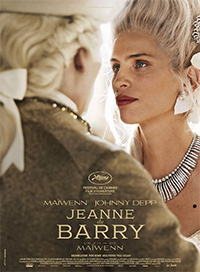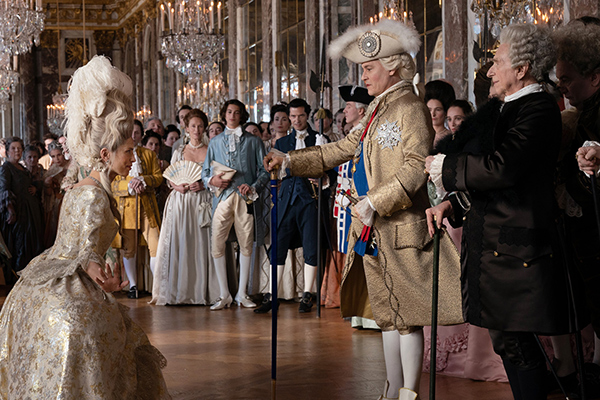Vanity Affair: Maïwenn Tarries with Madame du Barry
 For her sixth feature film, Maïwenn tackles her first period piece with Jeanne du Barry, resurrecting a historical footnote in the refreshed trend of obsessive royalty porn. Fittingly, a film dealing specifically with a royal scandal created one of its own when Johnny Depp was cast as Louis XV of France, the actor’s first film in three years following a high profile divorce, sullying his reputation in the court of public opinion. Such flotsam will eventually fade to the background while Maïwenn’s stab at royal fan fiction will more likely be remembered as a rather ho hum, cautiously attenuated escapade completely void of any real emotional authenticity (not to mention the film plays like the nadir of romantic melodrama). Maïwenn’s co-writers Teddy Lussi-Modeste (The Price of Success, 2017) and Nicolas Livechhi (Paris, 13th District, 2021) take considerable, presumptive liberties in the conception of Jeanne du Barry, the last official ‘maitresse-en-titre’ to an egregiously virile monarch.
For her sixth feature film, Maïwenn tackles her first period piece with Jeanne du Barry, resurrecting a historical footnote in the refreshed trend of obsessive royalty porn. Fittingly, a film dealing specifically with a royal scandal created one of its own when Johnny Depp was cast as Louis XV of France, the actor’s first film in three years following a high profile divorce, sullying his reputation in the court of public opinion. Such flotsam will eventually fade to the background while Maïwenn’s stab at royal fan fiction will more likely be remembered as a rather ho hum, cautiously attenuated escapade completely void of any real emotional authenticity (not to mention the film plays like the nadir of romantic melodrama). Maïwenn’s co-writers Teddy Lussi-Modeste (The Price of Success, 2017) and Nicolas Livechhi (Paris, 13th District, 2021) take considerable, presumptive liberties in the conception of Jeanne du Barry, the last official ‘maitresse-en-titre’ to an egregiously virile monarch.
Led by clunky narration attempting to be pithy (‘a girl who comes from nothing is ready for anything’), we’re guided through Jeanne’s childhood, raised by a poor seamstress whose wealthy employer liked the young girl enough to send her to a convent during her developmental years. Unfortunately, we’re told Jeanne’s voracious reading led her into the ‘unsettling sway of eroticism,’ resulting in her being expelled (in modern lingo, she knew where to find the boys and the booze). The ripple effect results in Jeanne’s mother being fired, and then becoming the equivalent of her daughter’s pimp in 1760s Paris. Jeanne meets the like minded Count du Barry (Melvin Poupaud), whose son Adolphe she comes to adore. Together with the Duke of Richelieu (Pierre Richard), the Count conspires to have Jeanne introduced to King Louis XV (Depp), knowing he will likely be transfixed by her. Their plan works and the king immediately stations Jeanne at Versailles. As fate would have it, Queen Marie Leszczynska died shortly after Jeanne’s installation. But to be accepted publicly in court, Jeanne must be married with a title, resulting in an immediate sham wedding to Count du Barry. Unfortunately, the church frowned on annulment, and this marriage furthered the impossibility of the king ever being able to make Jeanne his queen. When Louis’ grandson, the Dauphin (Diego Le Fur) marries Austria’s Marie Antoinette (Pauline Pollmann), Jeanne’s social position becomes suddenly precarious. Before Louis’ death from smallpox in 1774, Jeanne would spend her time trying to outmaneuver the king’s daughters, who vehemently opposed her presence.
The energy which would have actually befitted the tale of an infamous courtesan pre-French revolution necessitates something more intelligently written, like Patrice Leconte’s Ridicule (1996) with at least hints of Marquis de Sade inspired debauchery (which another Depp starrer, 2004’s The Libertine attempted to channel). Instead, Maïwenn concocted the most sanitized vision of social climbing and prostitution since Garry Marshall’s Pretty Woman (1990). The whole affair is so discreet and polite the major dramatic catalyst involves recently minted dauphine Marie Antoinette, sketched as a ditzy neophyte brainwashed into publicly snubbing Jeanne thanks to the king’s eldest daughter, an obnoxious, gluttonous rube played by India Hair. Instead, the film plays on the cliched hooker-with-a-heart-of gold tropes, enhanced by Jeanne’s allegiance to her official husband’s child, Adolphe, and an African child, Zamor, gifted to her by the king as plaything who would become her page.

More grievously, Maïwenn doesn’t ever allow for any interiority with Jeanne, which might have been possible had she directed someone else in the role. We never get a sense of Jeanne’s authentic feelings for her chosen profession as a way of survival (she says she prefers harlotry to the labor forced upon her mother, but only as a way to express her interest in ascension to Richelieu right before he utilizes her body). Instead, it would seem she craves a monogamous companionship (at least based on her ‘I wanna know what love is’ moment with Poupaud’s philandering Count). The film asks us to believe she actually falls for Louis, but this energy doesn’t actually transpire on screen, considering she moves from being a Flowers in the Attic toy to a gender-bending fashionista trendsetter in the court before ultimately construed as desperate for securing her social standing at court. Between all of these competing energies, love isn’t well attenuated except as the term awarded for a successful political maneuvering against one’s opponents.
Depp, acting for the first time entirely in French, isn’t as distracting as one might expect. Besides the vampiric mane, which attempts to rival his leading lady’s in volume, Depp is a rather even keeled persona. Meanwhile, a host of supporting notables are wasted, including Noemie Lvovsky and Pascal Greggory. Then there’s Hector Elizondo, pardon, Benjamin Lavernhe, who gets to be the emissary who trains Jeanne in the ways of the court only to become her trusted failsafe. But the real fly in the ointment is Diego Le Fur, the Dauphin who will eventually become Louis XVI, who looks like he was snatched off a photo shoot for the cover of a YA Harlequin novella and as emotionally animated as a robot formulated to regulate rude behavior amongst the royals.
Maïwenn also skips over potentially more interesting elements from Jeanne’s later years following the passing of Louis XV (though it should be mentioned she’s apparently as immune to smallpox as Virginie Efira was to the bubonic plague in Verhoeven’s Benedetta, 2021), later befriending Marie Antoinette and following her the guillotine. Grievously tepid, Jeanne du Barry seems to have been eclipsed by its own stunt casting with Depp, and as far as historical melodrama, is about as sluggish as the Otto Preminger-Ernst Lubitsch 1945 misfire, A Royal Scandal, despite starring Tallulah Bankhead as Russia’s Catherine the Great. But hey, nice gowns.
Reviewed on May 16th at the 2023 Cannes Film Festival – Opening Film. 117 Mins.
★½/☆☆☆☆☆


